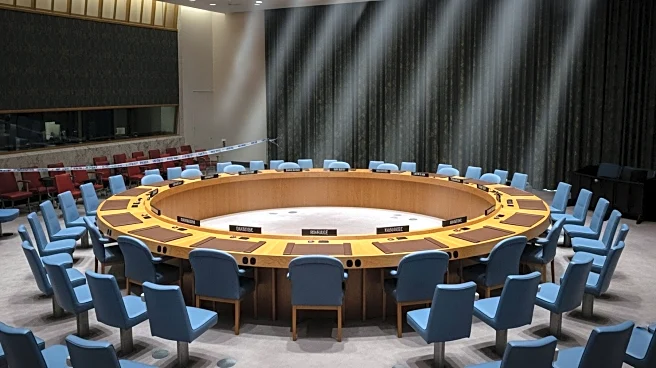What's Happening?
The United Nations Security Council is set to vote on a resolution aimed at establishing a sustainable peace and reconstruction framework for Gaza. The resolution, which builds on President Trump's 20-point
peace plan, proposes the creation of a Board of Peace to govern Gaza for two years, supported by international forces and Palestinian police trained by Egypt. The plan includes disarming Hamas and other factions, a key demand from Israel. However, the resolution faces opposition from some Israeli government members and potential vetoes from Russia and China. The lack of detail in the resolution has raised concerns among Western diplomats about its feasibility, even if passed.
Why It's Important?
The resolution's outcome could significantly impact regional stability and U.S. diplomatic efforts in the Middle East. A veto from Russia or China would stall the plan, affecting U.S. influence and Israel's security interests. The proposal's success or failure could alter the dynamics between Israel, Palestine, and other regional players, potentially affecting peace prospects and international relations. The plan's emphasis on disarmament and reconstruction highlights ongoing challenges in achieving lasting peace in Gaza, with implications for U.S. foreign policy and regional alliances.
What's Next?
If the resolution passes, the next steps involve implementing the Board of Peace and deploying the International Stabilization Force in Gaza. The disarmament process will be complex, with potential resistance from Hamas and other factions. The U.S. may need to navigate diplomatic challenges to assemble an international force willing to enter Gaza. The resolution's success could pave the way for Palestinian self-determination and statehood, contingent on the Palestinian Authority's reform progress. However, Israel's opposition to a Palestinian state remains a significant hurdle.
Beyond the Headlines
The resolution's implications extend beyond immediate political and security concerns. It raises ethical questions about governance and representation in Gaza, given the exclusion of Palestinian Authority representatives. The plan's focus on disarmament and reconstruction reflects broader geopolitical tensions and the struggle for influence in the region. The involvement of international forces and the potential for a Palestinian state highlight long-term shifts in regional power dynamics and the quest for peace.









